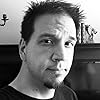WitWhimWiz
asked
J.-F. Dubeau:
Listening to A God in the Shed. Very cool so far, if confusing. This is a dumb question but... how do you find out so much about police procedure? I'm a cop's daughter and *I* don't know how to find out what cops do during murders! ???
J.-F. Dubeau
There's two answers to this.
The typical writer answer would be to brag about how much I've read on the subject. I've been fascinated by criminal pathology, serial killers and true crime for about a quarter of a century. I've been reading on the subject and going over notorious cases for ages. I also go to seminars and conferences on the subject. Especially those that focus on helping writers get it right. I avoid tv procedurals as they tend to be terrible with accuracy. Finally, I ask questions. If I'm looking at a scene and I'm not sure how it would play out, I ask around. People love nothing more than talking about what they love and if you find a cop or expert that wants to chat with you, you can get a lot of answers.
The second answer, the one a lot of authors won't tell you, is that we tend to fudge things a little. I don't mean get things wrong, though I'm sure I did here and there, but rather focus our research in the specific areas that are relevant to the scenes we write. I can go into details about chain of evidence, but I haven't looked into (until very recently) proper arrest procedures. I just never had to write about it and it's not something that gets covered much in true crime. There's also a few backdoors to excuse mistakes here and there. Since I don't know how far in the book you are, I won't risk spoilers, but I do leave myself a bit of wiggle room. Another example is leaving a few things vague. That helps both for pacing (I could stop the book for five pages to talk about decomposition, but that would do nothing for the narrative apart from allowing me to brag about how much I've read on decaying bodies) and it allows me to hand wave explanations I don't feel equipped to deal with.
Finally, there's also the grey area where things are never 100% clear anyway. I live in Canada and the procedures I refer are Canadian procedures for the most part. But I have to water that wine, so to speak, because it might read weird to my mostly American audience.
So it's a mix of thorough research, leveraging a passion of mine, asking questions and making hard decisions about where to be super accurate and where to keep it fuzzy for the story's sake.
I hope that answers your question and I hope the confusions about the book resolve themselves (for the most part) as you keep listening to it.
The typical writer answer would be to brag about how much I've read on the subject. I've been fascinated by criminal pathology, serial killers and true crime for about a quarter of a century. I've been reading on the subject and going over notorious cases for ages. I also go to seminars and conferences on the subject. Especially those that focus on helping writers get it right. I avoid tv procedurals as they tend to be terrible with accuracy. Finally, I ask questions. If I'm looking at a scene and I'm not sure how it would play out, I ask around. People love nothing more than talking about what they love and if you find a cop or expert that wants to chat with you, you can get a lot of answers.
The second answer, the one a lot of authors won't tell you, is that we tend to fudge things a little. I don't mean get things wrong, though I'm sure I did here and there, but rather focus our research in the specific areas that are relevant to the scenes we write. I can go into details about chain of evidence, but I haven't looked into (until very recently) proper arrest procedures. I just never had to write about it and it's not something that gets covered much in true crime. There's also a few backdoors to excuse mistakes here and there. Since I don't know how far in the book you are, I won't risk spoilers, but I do leave myself a bit of wiggle room. Another example is leaving a few things vague. That helps both for pacing (I could stop the book for five pages to talk about decomposition, but that would do nothing for the narrative apart from allowing me to brag about how much I've read on decaying bodies) and it allows me to hand wave explanations I don't feel equipped to deal with.
Finally, there's also the grey area where things are never 100% clear anyway. I live in Canada and the procedures I refer are Canadian procedures for the most part. But I have to water that wine, so to speak, because it might read weird to my mostly American audience.
So it's a mix of thorough research, leveraging a passion of mine, asking questions and making hard decisions about where to be super accurate and where to keep it fuzzy for the story's sake.
I hope that answers your question and I hope the confusions about the book resolve themselves (for the most part) as you keep listening to it.
More Answered Questions
About Goodreads Q&A
Ask and answer questions about books!
You can pose questions to the Goodreads community with Reader Q&A, or ask your favorite author a question with Ask the Author.
See Featured Authors Answering Questions
Learn more





